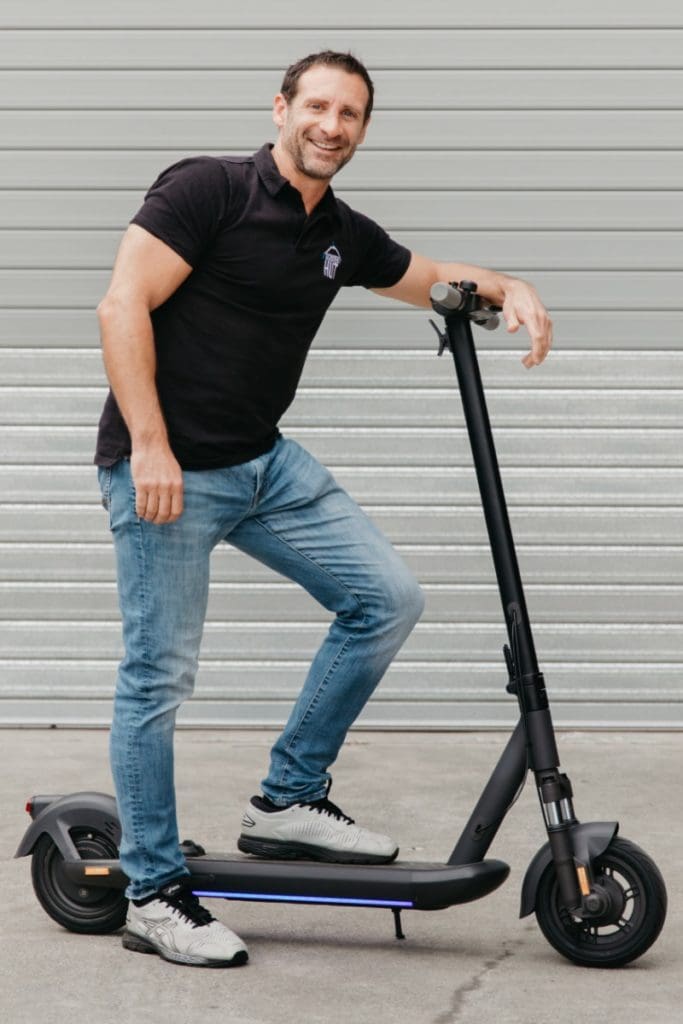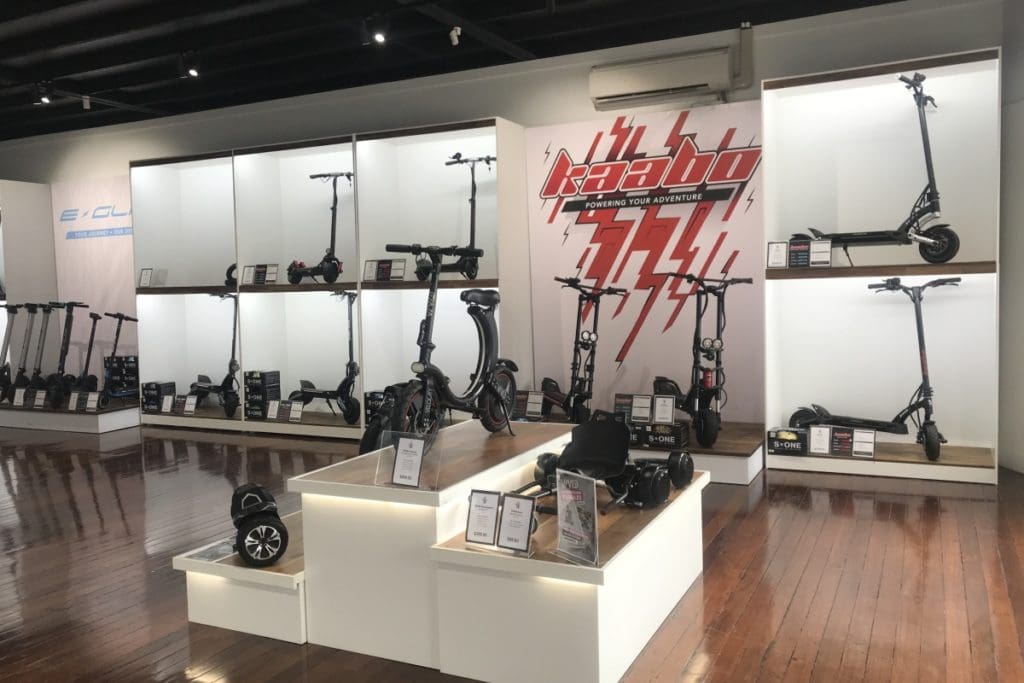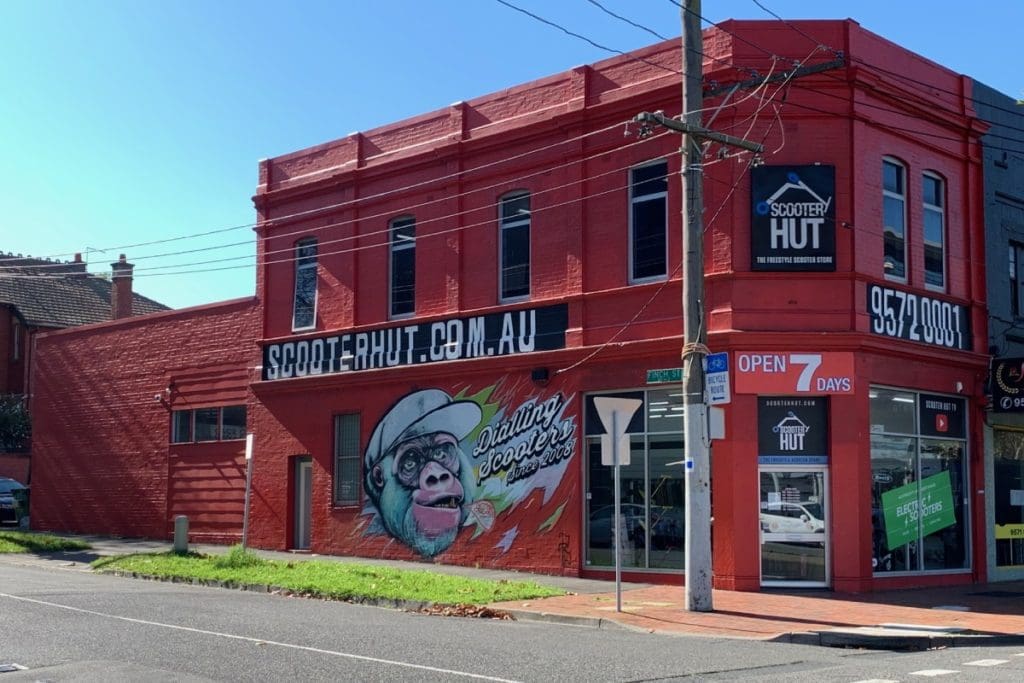Australia’s Leading Scooter Player Eyes the Bicycle Market

Scooter Hut and Freestyle Distribution are two names that might have flown under the radar of many bicycle industry members – until now.
Both are owned by founder Scott Mackintosh who spoke candidly with The Latz Report about his hugely successful current business and plans for rapid expansion.
As both Scott’s name and accent suggest, he was born far from the sunny Gold Coast where he now resides.
“I was brought up in the countryside in Scotland, on farms,” he said. “We’d be picking strawberries and raspberries and potatoes every school holidays from when I was about five.
“I first came here when I was 21 and set up my first business. That was 25 years ago.
“I came to visit my grandmother in Sydney. I spent four years in Sydney. Then a couple of years in Brisbane, then three years Melbourne, then went back to Scotland for about three years and got married there. Then I brought my wife and family out here in 2008.”
That was when Scott started Scooter hut, almost by accident.

“I’d started to import a kids’ ride-on toy,” he explained. “It had wheels on it that were very similar to scooter wheels.
“In 2008, trick scooters were very, very niche. It wasn’t a big thing at all for kids to do, but I had friends that had teenage boys and they asked me if I could get wheels for them because the wheels on this toy car were very similar to the wheels that they used for scooters.
“I got about 20 pairs of these wheels for the boys and they took them to the skate park. Two days later, they came to me and said, ‘Scott, can we get more of them?’ I said, ‘Oh, what has happened to them?’ They said, ‘We’ve sold them all.’
“I got them another 50 pairs. They sold them within a week, so I thought, ‘Okay, there’s a business here!’
“When I was sitting down with the web developer to look at building a website he asked me, ‘Do you have a name for this then?’ I said, ‘No, not really, but I really want to have ‘scooter’ in it because I think it’s important to have the name of what we do in it,’ and I said, ‘I quite like Scooter Hut.’
“He looked up to see if Scooter Hut was available, and it was. I sat there and drew the logo. It all happened in about a minute, really. Sometimes the best things aren’t planned.”
Armed with a business name, new website and presumably a larger order of wheels and other scooter stock on its way, it was time for Scott to set up his first premises.
“I got a warehouse and then had almost like an office-cum-shop that people could come into. It wasn’t really intentional that people would come in there. Mums and dads began to come along every single Saturday to buy scooters and get them fixed up as well, get them customized. We did that for about a year before opening up an actual shop.
“That was in Burleigh Heads on the Gold Coast. We’re still based on the Gold Coast.”
Fast forward 13 years and Scooter Hut is now by far the largest specialist retail chain in its category, with stores throughout Australia. Meanwhile the importing wholesale side, Freestyle Distribution is one of the world’s largest distributors of scooters.
“We’ve currently got 10 shops open across Australia,” Scott reported. “We’ve got plans to open up a further three stores this financial year and the business plan is that we get to 20 stores by 2024.

“We still predominantly have trick scooters and parts and accessories for them. Electric scooters, take up about 35 to 40% of our current floor space. They’ve really expanded a lot. Because of their higher prices they now account for about 50% of our revenue.
“The rest is just everything scooters: adult commuter scooters, kids’ three-wheeled scooters, and all the accessories and parts that you can hope to get for them. We also stock Evolve electric skateboards in some of our stores.”
Bike industry members would be envious to hear how scooter supply has been going.
“Our stock supply since covid started, has been not too bad actually,” said Scott. “We’re very well-organized. We’ve got really good relationships with the suppliers. We import most of the stock that we sell. Generally, our relationships with the suppliers have been long-term and are very strong.”
“We don’t ever buy from any supplier that I haven’t personally gone and spent time at their factory and spent time with them and the families. So we know them all really well. We have a general philosophy that it’s a partnership. We’re not the sort of distributor that pushes our suppliers down in price. We much prefer to focus on the quality of products and relationships.”
“The biggest issue that we have is container prices and availability. We’re very much in uncharted waters. That will be the biggest challenge for the next six months I think, just getting products in.”
“But we’ve already predicted for that, so a lot of our Christmas stock is either already here or about to land in the next month. We’ve got plenty of storage space. We own our warehouses.”
“I truly believe that scooters and bikes will, and should, sit side by side.“
E-bikes Coming Soon
Scott has been watching the e-bike market grow and plans to get involved soon.
“We haven’t sold e-bikes until now, but a lot of the suppliers we use do make electric bikes,” he revealed. “A lot of our wholesale customers sell electric bikes as well.
“We’ll probably focus on the more portable style of electric bike, the folding ones rather than the classic bikes.
“We’re looking at it. We’ve had a few samples. The difficulty I have right now is, because we’ll only work with factories that I have physically been to see, we’re a little bit limited to our current suppliers (due to travel restrictions).
“There’s one particular supplier that we are working with to just make a few more modifications on a portable electric bike. Once they’ve done that, we’ll probably be quite confident to take that to market early next year.”
Meanwhile the scooter market has also been booming and Scott’s business has been growing fast.
He continued, “We’ve had very strong growth over the years until 2018. Then 2018/19 was a year that we call the Fortnite Year. Kids got obsessed with the computer game, Fortnite. Kids that had been outdoors, all of a sudden, were just indoors all the time.
“I believe in that year, all sporting clubs, on average, saw about a 25% fall in kids playing sport. We were a bit of a victim of that, I suppose, but the scooter industry has been quite robust and it’s definitely bounced back a lot in the past two years.
“The rise in electric scooters was a big contributing factor to that and just a bounce back as well of kids getting outdoors again and onto their trick scooters.
“Last year, we grew our revenue by about 100%. We had a pretty good year. We’ve basically doubled our net from 2019 to 2020 to now, 2021.”
Illegal to Ride in Most States
Perhaps one reason for Scott’s rapid business growth is that while others have hesitated, he’s been prepared to go big with electric scooters, a product that’s still not legal to ride on the roads, bike lanes or footpaths of most Australian states.
This has not been a decision that he’s taken lightly.
“Every electric scooter we get in, we get a vehicle import license for it, so we cover that side of things,” he began.
“Every state has got slightly different rules and regulations, but by and large, electric scooters are only allowed to be ridden on private land.
“Every scooter we sell is speed-limited to 25 kilometres per hour. We get our customers to sign an understanding that they have been advised that the product they’re buying is only for use on private land.
“The reality of it is, of course, that people will choose to ride where they choose.
“We’re definitely not blasé about that. It’s something that we consider heavily when we choose to sell a product.
“But if we really want micromobility to become a part of society and a part of our infrastructure, then if we don’t get people riding electric scooters and electric skateboards and things that people want to do, then the movement to change will be incredibly slow.
“It might never happen, actually.
“As a company, and as a person that is exceedingly law-abiding, I’m a real stickler for those rules. To be honest, it’s a difficult situation really for me, personally, to be in.
“I don’t think it’s a difficult position for the business to be in, because we’re abiding by every law that is there. But there’s a slight moral dilemma for me in knowing that some of our customers will buy a product from us and are likely to use it in an area that they’re not supposed to use it.
“But this is how people want to get about. It’s what makes sense for people to get about on.
My opinion is that electric scooters are, if ridden properly, are at least as safe, if not safer than riding a bicycle.”

Share Schemes Will Boost Sales
Electric scooter share schemes are either launched or in planning in all but one of Australia’s capital cities. Far from seeing these as a threat, Scott welcomes them.
“I think the share schemes are definitely doing more good than harm,” he assessed.
“Especially the way that they’re now run is absolutely fantastic. The greatness about them is that it lets this type of getting around cities become the most normal thing in the world.
“The example obviously is Brisbane, where two years ago, people would stare and maybe get even a bit frustrated at the scooter riders going past them.
“There was a buzz about the town and it was a bit divisive. ‘What the hell are these doing in our city? These don’t belong here!’
“Three years on, just anecdotally from living in Queensland and people talking about the city and how it’s transformed and how Brisbane is a modern city, it’s amazing how many of those conversations start with or at least include, the electric scooters as being part of the vision of Brisbane being a great city to live in.
“I think they have a really positive effect on just generally people getting out of their cars and getting across the city in a reasonably short time. Of course, the knock-on effect is that they become just part of everyday life.
“I like the rideshare model. I like the concept of it, and I think it definitely has a place to play in cities, but I think consumers like to own something as well. They like to own a product that sits in their house. They can use it anytime they want and no one else can touch it.
“What I see a lot in consumerism is that people like to also upgrade the vehicle that they have, whether it’s their car, their bicycle, their trick scooter. Even kids we sell three-wheel scooters to, they want to upgrade the grips to different colours or add some tassels onto them. “Everyone likes to have something that is their own. I think that fundamental instinct that we all have says to me that the real big industry in all of this is the selling and the actual consumer market for electric scooters, rather than the share programs.”
Will E-scooters Impact Bicycle Sales?
“People our age (mid-40’s and over) were brought up on bicycles really,” said Scott. “Bicycles seem like the most natural thing to get on, the easiest thing to ride. Scooters, to be honest, if you weren’t brought up on it, seem a bit less safe and a bit less stable in a way.
“But the customers that we’ve been serving for the past 12 years are kids who have been riding kick scooters.
“For them, that position of being upright, holding onto handlebars, kicking with your foot is very natural for them. What we’ll end up seeing is people who will choose to ride a scooter rather than a bicycle for specific purposes. Probably the scooter will win for the type of person who is going into work or going to somewhere where a scooter can easily be carried and taken upstairs.
“I think the bicycle will always win for people who are wanting to go a longer distance and who actually want to get a bit more exercise out of that journey as well. I truly believe that scooters and bikes will, and should, sit side by side.
“The dream I have is that bicycles, scooters, electric skateboards, I believe they should all live in the bike lane. In this kind of transit lane really, where all the vehicles in that lane are doing similar speeds, around about that 20 to 30 kilometres per hour and occupied by what I would say are like-minded people. People who have chosen to not take their car out and get to work or get to the shops or go and have fun on that mode of transport.
“I truly believe that the mindsets of a cyclist, a scooter rider, a skateboarder are really, really similar.
Time For Governments to Step Onboard
“It’s a tough position that we’re in, but I think the real safety issue for people is the inaction from the government to at least accommodate electric scooters and electric skateboards,” Scott asserted. “That’s the biggest risk, rather than the riders themselves.
“Most of our sales are coming from Queensland where it’s been legal to ride an electric scooter on footpaths for over two years now. There’s a huge uptake here. We’re seeing the same thing in ACT as well. They’ve been legalized now for about eight months, I think.”
“For the rest of the states, legalisation or at least adoption and some allowance of electric scooters, will have a very profound effect, not just on our business, but I think on many other businesses as well. It would open up a whole world of new customers.
“We have a long list of customers who have put their names down, but who are very law-abiding people and don’t want to buy and ride an electric scooter until it’s legalized in their state. That list is growing every week. People come into the shop, love the electric scooters, want to take one home, but when we explain to them that they can’t legally ride it on a public footpath or road, they leave their contact details and say, ‘As soon as it’s legalized, I want to get one.’
“The unfortunate thing I think that has happened in Australia is the states that have legalised electric scooters have positioned them on footpaths, which has had two effects.
“One, is it’s antagonized pedestrians.
“I can totally understand why because I don’t like the idea of a vehicle that can go at 25 kilometres per hour being on a footpath where people are generally doing five or six kilometres per hour, and ambling as well. You’re not always walking in a straight line.
“I think it’s the wrong place for scooters to be.
“It also creates a problem for the scooter rider as well, having to watch out for pedestrians and people coming out of a doorway, et cetera.
“The reason that they went onto the footpaths in Queensland was purely political because the state government didn’t want to have the responsibility of the electric scooters on the part of the road that they own, which is the road and the bike lane, and the local council (Brisbane City Council) accepted that their footpaths were okay to take electric scooters on.
“The politics of that is frustrating because I think what they’ve ended up doing is putting electric scooters on the wrong part of the road. They should belong in bike lanes, I think. “That’s another fight for us to have at some point!”
Join the Conversation:
Do you think e-bikes and e-scooters can happily coexist?

High powered electric scooters are dangerous as hell. There should be limits on the motor sizes AND speed. These scooters are sold knowing that they will be hacked past 25kph. Heck the distro will tell you how to hack it even. A death in brisbane on a scooter just as this went to air. I think the owner of scooter hut knows selling these scooters is wrong, and is struggling with the morals of it, meanwhile- He’s more than happy to take the cash behind the company name. Shame.